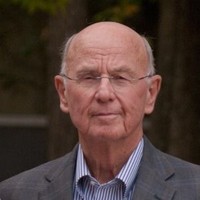A widely monitored and hotly contested patent dispute in the oil patch likely ended Tuesday when a federal appeals court ruled that energy giant Schlumberger did not infringe on the intellectual property of a legendary Houston energy inventor.
The U.S. Court of Appeals for the Federal Circuit ruled Tuesday that Schlumberger did not violate hydraulic fracturing technology methods patented by EnerPol and its founder, Dr. Claude E. Cooke Jr.

The unanimous 3-0 opinion authored by Federal Circuit Judge Kara Farnandez Stoll upholds an earlier decision by an East Texas federal trial judge rejecting allegations by EnerPol that Schlumberger illegally “adopted important and valuable technical innovations made by Dr. Cooke.”
“We’re pleased with the Federal Circuit’s well-reasoned opinion and its vindication of the position Schlumberger took before discovery started,” said Max Grant, a partner at Latham & Watkins, which is representing Schlumberger in the litigation.
The dispute started in 2017 when Dr. Cooke, who worked for three decades as an oil and gas engineer and scientist at ExxonMobil Upstream and is a member of the Petroleum Engineering Hall of Fame, sued Schlumberger in the U.S. District Court for the Eastern District of Texas.
A 1974 graduate of the University of Houston Law Center and a 1954 graduate of the University of Texas with a Ph.D in physics, Dr. Cooke holds patents on 30 inventions involving oil recovery processes and methods increasing the production rate of oil wells using hydraulic fracking methods.
A key argument in the litigation came down to whether the construction of the phrase “polymer-continuous liquid phase” in U.S. Patent No. 6,949,491 should be construed as one term or two terms. The patent describes technological methods for “increasing flow rate of wells by injecting a highly viscous material, which may be a thermo-plastic degradable polymer, which may contain proppant particles, into an earth formation surrounding a well.”
The bottom line: Dr. Cooke and his lawyers claimed that “polymer-continuous liquid phase” should be construed as two terms, while Schlumberger argued that it should be interpreted as a single phrase.
As part of the litigation, EnerPol filed an emergency petition asking U.S. District Chief Judge Rodney Gilstrap of Marshall to “preemptively strike” specific arguments from Schlumberger’s technical tutorial to the court, as well as any future briefs filed in the case, because those positions had not been previously disclosed.
Judge Gilstrap rejected the legal maneuvering.
“The Court analogizes the current situation to Schlumberger striking a match to light its cigar while sitting in the balcony of a crowded theater, with EnerPol in response jumping to its feet and screaming, ‘Fire!’ There is no emergency here,” the judge ruled in 2018.
Realizing Judge Gilstrap was going to rule against EnerPol, the company filed a stipulated judgment of non-infringement of all of its claims and appealed to the Federal Circuit.
Schlumberger filed a cross-appeal, claiming that the Federal Circuit did not have appellate jurisdiction to hear EnerPol’s arguments.
Judge Stoll, joined by appellate judges Jimmie Reyna and Richard Taranto, rejected Schlumberger’s position that the Federal Circuit “lacks jurisdiction to review EnerPol’s appeal from the district court’s noninfringement judgement.”
“We are not persuaded by Schlumberger’s challenge to our court’s jurisdiction,” Judge Stoll wrote. “The district court’s final judgment clearly identifies the claim terms affecting the infringement analysis.”
But as quickly as the Federal Circuit gave EnerPol an opening, it slammed the door shut, affirming Judge Gilstrap’s ruling on the claim construction and upholding the final judgment of non-infringement.
“EnerPol’s proposed construction ignores crucial teachings in the specification and would result in a polymer-continuous liquid phase that cannot function as a fracturing fluid,” the Federal Circuit ruled.
The other lawyers joining Grant in representing Schlumberger are Greg Sobolski, Gabriel Bell and Robert Gajarsa of Latham, and Claire Henry of Ward & Smith in Marshall.
Fish & Richardson is representing Dr. Cooke and EnerPol, according to court documents.
